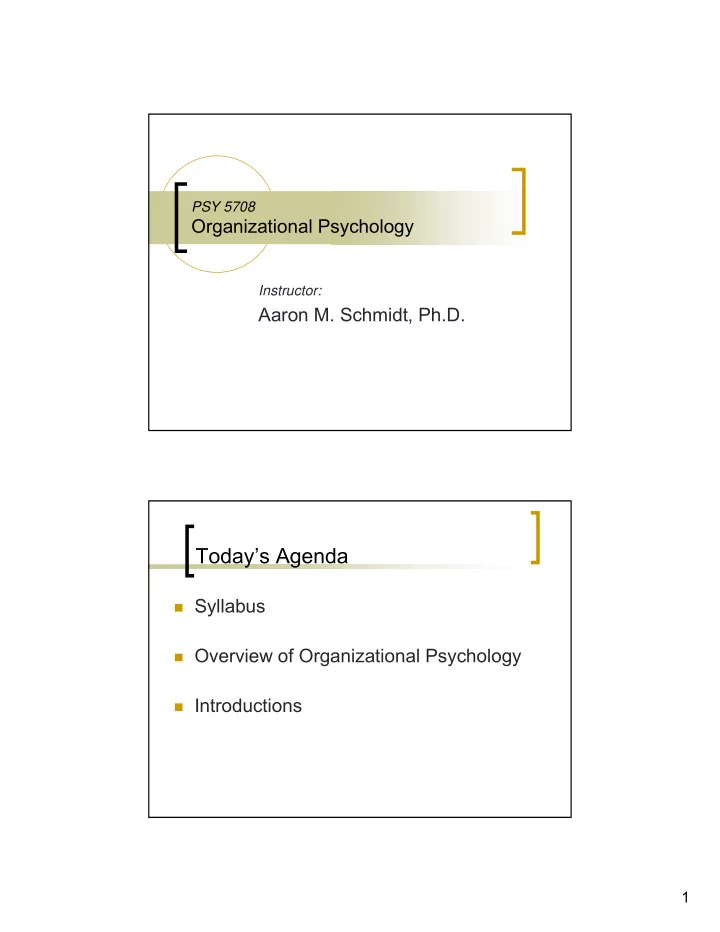

PSY 5708 Organizational Psychology Instructor: Aaron M. Schmidt, Ph.D. Today’s Agenda Syllabus Overview of Organizational Psychology Introductions 1
Syllabus Overview please refer to syllabus… I will email a PDF copy after class Course website: https://goal-lab.psych.umn.edu/orgPsych/ Is currently experiencing technical problems… What is Organizational Psychology? What is I/O Psychology? The scientific study of individual behavior in formal organizational settings Groups, organizations, and other collectives are also of great interest, insofar as they: influence individual behavior (top-down effect) are influence by individual behavior (bottom-up effect) However, collectives not typically of focal interest as stand-alone entities What distinguishes I/O psychology from psychology at large? Context first and foremost Does I/O effectively utilize the general psychology literature? Does I/O contribute to general knowledge of psychology? 2
What distinguishes Organizational psychology from Industrial psychology? Topics: Person vs. Situation : Lewin’s field theory: B = f(P,E) Talent Acquisition vs. Development & Management Artificial distinction? Considerable blurring b/w areas!!! What is the difference between Organizational Psychology and Organizational Behavior (in Business School? OB: (a) the study of human behavior in organizations, (b) the interface between human behavior and the organization, and (c) the organization itself (Moorhead & Griffin, 1995) Parts a and b are similar, c is quite different In Org Psych, the interest is always on human behavior. In OB, this is often not the case Education and skill differences: The analytical/methodological skills of I/O psychologists tend to be stronger than those from OB I/O: greater emphasis on empirical evaluation (show me the data!) OB: greater emphasis on theory, case studies (tell a good story!) Those in OB tend to have more formal business/finance training 3
The Scientist-Practitioner Model Key tenets of both I and O psychology and less-so for field of Organizational-Behavior Application of good science in organizations Importance of research linked to applied needs Upcoming Classes For Thursday: Highhouse, S. & Schmitt, N. W. (2012). A Snapshot in Time: Industrial–Organizational Psychology Today. In N. Schmitt & S. Highhouse (Eds.). Handbook of Psychology: Industrial and Organizational Psychology (vol 12, revised). Taylor, F. W. (1911). The principles of scientific management . Harper & Row (pp. 30-48, 57-77) For next Tuesday: Roethlisberger, F., & Dickson, W. J. (1939). Management and the worker (pp. 511-524). McGregor, D.M. (1960). The Human Side of Enterprise . (Chapters 3 and 4, pp. 33 – 57). Senge, P. M. (1990). The Fifth Discipline . Chapters 4 and 5 (pp. 57 – 92). New York: Doubleday. Next Thursday: Costa, P. L., Graça, A. M., Marques-Quinteiro, P., Santos, C. M., Caetano, A., & Passos, A. M. (2013). Multilevel research in the field of organizational behavior: An empirical look at 10 years of theory and research. Sage Open, 3 , 1-17. * Kozlowski, S. W. J., & Klein, K. J. (2000). A levels approach to theory and research in organizations. In K. J. Klein & S. W. J. Kozlowski (Eds.), Multilevel theory, research and methods in organizations (pp. 3- 90). San Francisco, CA: Jossey-Bass. A tough read, but lots of great information * Only pages 38-45 is required reading. In particular, Figure 1.1 (pg. 39) is key! Jex & Britt, Chapter 2: Research Methods and Statistics, Organizational Psychology (2 nd Ed.) 4
Recommend
More recommend